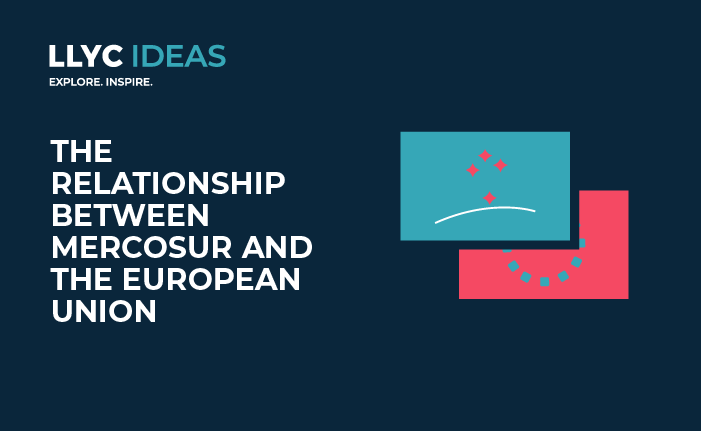-
TrendsPublications and Reports
-
CountriesBrazilPortugalGlobal
The prospect of a trade agreement between Mercosur and the European Union is a unique and promising opportunity for both parties. After more than two decades since negotiations began, the window of opportunity is now open again. Thus, in the coming weeks, the focus will be on the negotiations led by Spain and Brazil, which will assume the presidencies of the European Union and Mercosur, respectively. These two countries will play a key role in mediating between the different opinions and interests of the nations involved.
The report “The Relationship between Mercosur and the European Union“, prepared by LLYC’s global Public Affairs team, analyzes the main economic and commercial advantages of a treaty that, once signed, will allow more than 30 countries to trade freely with each other in a free market that will grow from 500 million to 780 million people. This represents 20% of the world’s GDP and 30% of global exports.
It is therefore essential that companies in both blocs are prepared for the challenges and opportunities of this new business environment. Measures such as tariff reductions, trade facilitation and the promotion of cooperation in research and innovation are identified in the study as opportunities for economic growth and strengthening relations between countries. “The signing of the Mercosur/EU agreement represents a new era of possibilities for the countries involved. Our study aims to provide valuable information on the impacts, promising sectors, obstacles and initiatives of the agreement, allowing companies to strategically position themselves and maximize the benefits of this historic partnership,” concludes Flavia Caldeira, senior director of LLYC Brazil.
On the European side, Portugal will be one of the countries that will benefit most from the trade agreement:
– Exports: Portuguese exports to Brazil have declined in recent years, so the agreement could lead to a further increase that reverses the current state of the trade balance between the countries, currently unfavorable for Portugal.
– Wine: Portugal ranks third on Brazil’s list of wine suppliers, behind Chile and Argentina (both without customs tariffs). With the agreement, Portugal can easily move up to second place on this list.
– Automobiles: Brazil and Argentina produce around 3.5 million vehicles per year. Currently, this industry’s products are taxed at 35%, so the national automotive industry, with a turnover of 9.4 billion euros, may benefit.
– SMEs: The Portuguese business fabric is mostly made up of small and medium-sized companies, so the creation of a platform that facilitates access to information and provides support in the procedures required to export can be seen as an opportunity for internationalization and growth for Portuguese SMEs.
Among the Mercosur countries, Brazil will achieve considerable trade benefits for various sectors of its economy:
– Machinery and automotive parts: the entry into force of the agreement has the potential to open up new markets, covering 22 EU countries, which import around US$63 billion annually. Brazilian opportunities are concentrated in some 76 products that will benefit from differentiated duty-free treatment for up to four years.
– Chemical and pharmaceutical sectors: With an import market of around US$29.4 billion (the average of the last five years), spread over 24 different EU countries, Brazil has an average market share of 3.8% (around US$1.1 billion). To take advantage of these opportunities, Brazilian companies must invest in research and development, innovation and technology, in addition to meeting stringent European standards and requirements.
– Textiles: The agreement will lead to an increase in Brazilian exports thanks to a tariff reduction that will last for up to seven years.
– Footwear: Brazil currently exports an average of US$102 million a year in footwear to these countries, representing approximately 2.5% of total exports, which demonstrates enormous growth potential. The main markets with identified opportunities for the footwear sector are Germany, France, and the Netherlands, with tariff relief to be extended for up to seven years. European customer loyalty can be achieved by strengthening brand identity through investment in marketing campaigns and e-commerce.
– Hygiene and beauty products: the European market is extremely attractive for the cosmetics, personal care and perfumery industry due to its high demand and growing interest in natural and sustainable products, attributes common to Brazilian products.
– Dairy: The agreement has the potential to boost dairy exports, with quotas established for products such as cheese, powdered milk and infant formulas, as well as organic products with differentiated characteristics. To increase consumer confidence and access niche markets with higher added value, it is important to seek internationally recognized quality and sustainability certifications, such as the International Featured Standards (IFS) and the EU organic seal.
– Beef and poultry: One of the main challenges is to comply with the animal welfare concerns of the European market. Joint actions with local importers and distributors, as well as participation in international trade fairs and events in the sector, are strategies that can help promote the positive image of Brazilian beef. These initiatives, together with the commitment to international standards and the adoption of sustainable practices, will enable the sector to take advantage of the opportunities generated by the agreement.
– Fruits and vegetables: Industry players must adopt strategies that include investments in preservation and packaging technologies, as well as the construction of an efficient logistics network, to guarantee the quality and freshness of products in an extremely demanding market.
– Grains: Thanks to the agreement, soybeans, corn, wheat and rice have great growth potential. Improved communication, by disseminating the increased use of sustainable production technologies, such as the integration of crops, livestock and forestry and obtaining international certifications, should help combat the negative perception that often associates Brazilian producers with deforestation and unsustainable practices.
Despite the unquestionable advantages of the EU/Mercosur agreement, it has been opposed by several countries and organizations. Among the European opponents are Austria, France, Ireland and the Netherlands. And the main reasons for the divergence between the two blocs have to do, above all, with environmental, agri-food and humanitarian motivations.
Read the full report here.



